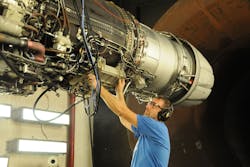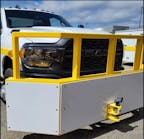“The Technician Challenge” has been a catch phrase used by management for several years to convey their impending uncertainty about the results of the declining numbers of technicians in all maintenance industry segments. Though the problem is not confined to the United States, it isn’t quite a worldwide epidemic. However, unless unconventional means are considered in meeting this shortage head-on, it could become one.
Keeping up with current industry growth trends and retirement rates may be a challenge, especially for GSE maintenance managers. They can find themselves coping with attrition by way of retirement, losing seasoned technicians from their ranks. At the same time, they’re competing for employees with countless dealerships, independent repair garages, and fleets who are all pulling from the same pool of trade school graduates and already employed technicians. Managers will need to look for unconventional solutions to meet their need for skilled technicians.
According to the latest figures from the U.S. Department of Labor, within the United States more than a million jobs exist today in the auto, diesel, and collision repair industries. Growth in these segments is projected to be 17% through the year 2020. Baby boomers, who make up roughly 26% of the American population, will reach retirement age every day though 2029, according to the Pew Research. That means that approximately 10,000 people, per day, will be retiring between 2020 and 2030.
As of late, the media has highlighted the issues about Medicare coverage for those Americans who must rely on it for their sole health insurance by the time they are eligible for retirement. Health care (and insuring for it) can cost the average person a lot of money. The fact is that, while there are more people becoming eligible for Medicare, the labor force that funds the program is shrinking. Any physician I talk to about it tells me that Medicare “as we know it” is already gone. Existing government policies and procedures to limit care through it probably serve to support the notion that Medicare is going bankrupt.
There is some discussion among managers that the debate over health care policy, the interrelated outcomes and increase in medical costs, may well become an influencing factor in the postponing of retirement for, and thus retention of, technicians currently in the GSE maintenance workforce. It might seem likely, but not a guarantee, that if Medicare fails, technicians will opt either to extend their careers longer (if they can meet the physical demands of the job) or turn to other types of employment so that they can maintain their health care benefits. Part 2 of this article will suggest that there may soon be technology available that can be adapted to enable these GSE specialists to extend their ability to work without sacrificing their health. For now, let’s stay in the present.
Empirical evidence suggests that GSE maintenance managers who recruit from outside the ground support equipment industry favor employing experienced Diesel and Medium/Heavy-Duty Truck or Equipment mechanics. These mechanics tend to transition well into the GSE technician role. However, the number of those skilled workers is becoming limited. Most managers are reluctant to hire trade school graduates who have little or no workshop or airfield experience. According to The National Institute for Automotive Service Excellence (ASE), annually only about 3,500 diesel and truck technicians enter the job market through technical trade schools. So, while on the one hand, more and more seasoned mechanics are retiring each year, on the other hand, the number of those who are trained in diesel or medium/heavy-duty truck or equipment repair isn’t enough to meet the demand for their replacements.
Finding Talent
Today, when GSE maintenance managers interview those who are viewed as “experienced” applicants from other maintenance industries, it seems that most of those applicants are “recycles” from companies and may not be the most desirable prospects. With such a widespread notion that most people worth employing are already established elsewhere, employment decisions become concessions or compromises.
In this day and age, allowing such biases to influence your hiring decisions against archetypes of the “perfect technician” leads you to lose out on opportunities and delays you from bringing a qualified worker on board. If you wait until you find a technician with the “exact” skills and depending on the pay and benefits package you offer, it may take some time before you fill your opening. While offering higher wages to attract that “ideal” candidate from another company is an option, it isn’t a guarantee for success.
In a previous article, we focused on the various forces that influence the wages of GSE mechanics. We deduced that offering higher wages isn’t always an available option. So, maintenance managers turn to lowering their existing headcount so that they can offer a higher earning potential to lure qualified candidates away from their current employers, assuming that they can produce more than the mechanics they have released.
If policy changes, recruiting in international markets could be another source of securing talent. I spent two years in the Middle East, prior to my current position, managing large and diverse work groups. I actively recruited in Africa, Asia, the United Kingdom, and the Philippines. I found that there is a pool of very willing and capable technicians in countries outside the United States. Unfortunately, under the current U.S. Immigration Policy, mechanics/technicians are considered “Non-Specialized Workers” and, as such, it can take more than a decade to obtain the required work visa for an applicant if you were to start the international recruitment process now. The average cost for processing such a candidate is $5,000. Obviously, under the current constraints, international recruitment is not a viable option for slots that need to be filled now.
While the situation may seem bleak for fleet maintenance, the further innovation and adaptation of technology on the horizon may be the key to meeting the challenge of finding and hiring quality GSE technicians.
TO BE CONTINUED...
Will Ryder is Director of Strategic Initiatives and Support Services at Global Aviation Services, LLC and has worked over 25 years in fleet maintenance, including international experience. He now reports to the President of his company and is responsible for developing, overseeing and helping to implement programs and projects. Additionally he oversees the Quality Management System as well as the Support Services functions.






